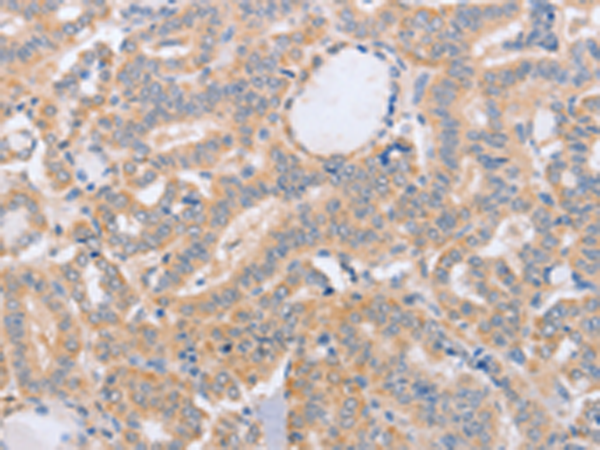

| WB | 咨询技术 | Human,Mouse,Rat |
| IF | 咨询技术 | Human,Mouse,Rat |
| IHC | 1/25-1/100 | Human,Mouse,Rat |
| ICC | 技术咨询 | Human,Mouse,Rat |
| FCM | 咨询技术 | Human,Mouse,Rat |
| Elisa | 1/1000-1/5000 | Human,Mouse,Rat |
| Aliases | CD157 |
| Host/Isotype | Rabbit IgG |
| Antibody Type | Primary antibody |
| Storage | Store at 4°C short term. Aliquot and store at -20°C long term. Avoid freeze/thaw cycles. |
| Species Reactivity | Human, Mouse, Rat |
| Immunogen | Synthetic peptide of human BST1 |
| Formulation | Purified antibody in PBS with 0.05% sodium azide and 50% glycerol. |
+ +
以下是关于BST1抗体的模拟参考文献示例(内容仅供示例,非真实文献):
---
1. **文献名称**:*"Characterization of a Novel Monoclonal Antibody Against BST1 for Immunohistochemical Applications"*
**作者**:Tanaka A, et al.
**摘要**:研究团队开发了一种针对BST1的新型单克隆抗体,验证了其在石蜡包埋组织中的特异性,成功应用于帕金森病患者脑组织的免疫组化检测,揭示了BST1在神经元中的异常表达模式。
2. **文献名称**:*"BST1 Autoantibodies as a Potential Biomarker in Autoimmune Disorders"*
**作者**:Martinez R, et al.
**摘要**:通过ELISA技术检测血清中的抗BST1自身抗体,发现其在系统性红斑狼疮(SLE)患者中显著升高,提示其可能参与自身免疫病理过程,并具有诊断价值。
3. **文献名称**:*"Therapeutic Targeting of BST1 with Neutralizing Antibodies Suppresses Tumor Growth in Colorectal Cancer Models"*
**作者**:Wang L, et al.
**摘要**:研究报道了一种中和性抗BST1抗体,通过阻断BST1介导的细胞信号通路,在结直肠癌小鼠模型中显著抑制肿瘤增殖和转移,为癌症治疗提供新策略。
4. **文献名称**:*"BST1 Antibody-Based Flow Cytometry Analysis in Hematopoietic Stem Cells"*
**作者**:Klein S, et al.
**摘要**:利用抗BST1抗体优化流式细胞术方案,成功分离骨髓基质细胞中的特定亚群,为干细胞研究和临床分选提供可靠工具。
---
注:以上内容为示例性模拟,实际文献需通过学术数据库检索确认。
The BST1 (Bone Marrow Stromal Cell Antigen 1) antibody targets the BST1 protein, a glycosylated cell surface enzyme also known as CD157. BST1 belongs to the ADP-ribosyl cyclase family and shares structural homology with CD38. playing roles in NAD metabolism, calcium signaling, and cell adhesion. Initially identified in bone marrow stromal cells, it is expressed in immune cells, endothelial cells, and certain cancer tissues. BST1 regulates immune responses, leukocyte migration, and hematopoietic stem cell interactions in the bone marrow niche.
Research links BST1 to autoimmune diseases, cancer progression, and neurodegenerative disorders. Genome-wide studies associate BST1 polymorphisms with Parkinson’s disease risk, suggesting its involvement in neuroinflammation. In oncology, BST1 overexpression in leukemia, myeloma, and solid tumors correlates with metastasis and immune evasion, making it a potential biomarker or therapeutic target.
BST1 antibodies are essential tools for detecting protein expression in techniques like flow cytometry, immunohistochemistry, and Western blot. They aid in studying BST1's functional roles in cell signaling, tumor microenvironments, and immune regulation. Therapeutic applications are emerging, with monoclonal antibodies explored for blocking BST1-mediated pathways in cancers or autoimmune conditions, akin to CD38-targeting therapies like daratumumab. However, its dual enzymatic and receptor-like activities complicate mechanistic understanding, necessitating further research to clarify its pathophysiological roles and therapeutic potential.
×